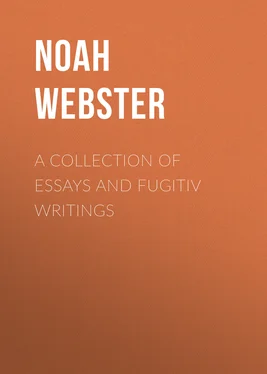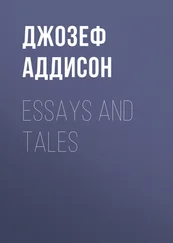Noah Webster - A Collection of Essays and Fugitiv Writings
Здесь есть возможность читать онлайн «Noah Webster - A Collection of Essays and Fugitiv Writings» — ознакомительный отрывок электронной книги совершенно бесплатно, а после прочтения отрывка купить полную версию. В некоторых случаях можно слушать аудио, скачать через торрент в формате fb2 и присутствует краткое содержание. Жанр: foreign_prose, foreign_antique, на английском языке. Описание произведения, (предисловие) а так же отзывы посетителей доступны на портале библиотеки ЛибКат.
- Название:A Collection of Essays and Fugitiv Writings
- Автор:
- Жанр:
- Год:неизвестен
- ISBN:нет данных
- Рейтинг книги:5 / 5. Голосов: 1
-
Избранное:Добавить в избранное
- Отзывы:
-
Ваша оценка:
- 100
- 1
- 2
- 3
- 4
- 5
A Collection of Essays and Fugitiv Writings: краткое содержание, описание и аннотация
Предлагаем к чтению аннотацию, описание, краткое содержание или предисловие (зависит от того, что написал сам автор книги «A Collection of Essays and Fugitiv Writings»). Если вы не нашли необходимую информацию о книге — напишите в комментариях, мы постараемся отыскать её.
A Collection of Essays and Fugitiv Writings — читать онлайн ознакомительный отрывок
Ниже представлен текст книги, разбитый по страницам. Система сохранения места последней прочитанной страницы, позволяет с удобством читать онлайн бесплатно книгу «A Collection of Essays and Fugitiv Writings», без необходимости каждый раз заново искать на чём Вы остановились. Поставьте закладку, и сможете в любой момент перейти на страницу, на которой закончили чтение.
Интервал:
Закладка:
There is one general practice in schools, which I censure with diffidence; not because I doubt the propriety of the censure, but because it is opposed to deep rooted prejudices: This practice is the use of the Bible as a school book. There are two reasons why this practice has so generally prevailed: The first is, that families in the country are not generally supplied with any other book: The second, an opinion that the reading of the scriptures will impress, upon the minds of youth, the important truths of religion and morality. The first may be easily removed; and the purpose of the last is counteracted by the practice itself.
If people design the doctrines of the Bible as a system of religion, ought they to appropriate the book to purposes foreign to this design? Will not a familiarity, contracted by a careless disrespectful reading of the sacred volume, weaken the influence of its precepts upon the heart?
Let us attend to the effect of familiarity in other things.
The rigid Puritans, who first settled the New England States, often chose their burying ground in the center of their settlements. Convenience might have been a motive for the choice; but it is probable that a stronger reason was, the influence which they supposed the frequent burials and constant sight of the tombs would have upon the lives of men. The choice, however, for the latter purpose, was extremely injudicious; for it may be laid down as a general rule, that those who live in a constant view of death, will become hardened to its terrors.
No person has less sensibility than the Surgeon, who has been accustomed to the amputation of limbs. No person thinks less of death, than the Soldier, who has frequently walked over the carcasses of his slain comrades; or the Sexton, who lives among the tombs.
Objects that affect the mind strongly, whether the sensations they excite are painful or pleasureable, always lose their effect by a frequent repetition of their impressions. 3 3 The veneration we have for a great character, ceases with an intimate acquaintance with the man. The same principle is observable in the body. High seasoned food, without frequent intervals of abstinence, loses its relish. On the other hand, objects that make slight impressions at first, acquire strength by repetition. An elegant simplicity in a building may not affect the mind with great pleasure at first light; but the pleasure will always increase with repeated examinations of the structure. Thus by habit, we become excessively fond of food which does not relish at first tasting; and strong attachments between the sexes often take place from indifference, and even from aversion.
Those parts of the scripture, therefore, which are calculated to strike terror to the mind, lose their influence by being too frequently brought into view. The same objection will not apply to the history and morality of the Bible; select passages of which may be read in schools to great advantage. In some countries, the common people are not permitted to read the Bible at all: In ours, it is as common as a newspaper, and in schools, is read with nearly the same degree of respect. Both these practices appear to be extremes. My wish is not to see the Bible excluded from schools, but to see it used as a system of religion and morality.
These remarks suggest another error which is often committed in our inferior schools: I mean that of putting boys into difficult sciences, while they are too young to exercise their reason upon abstract subjects. For example; boys are often put to the study of mathematics, at the age of eight or ten years; and before they can either read or write. In order to show the impropriety of such a practice, it is necessary to repeat what was just now observed, that our senses are the avenues of knowlege. This fact proves that the most natural course of Education is that which employs, first the senses or powers of the body, or those faculties of the mind which first acquire strength; and then proceeds to those studies which depend on the power of comparing and combining ideas. The art of writing is mechanical and imitative; this may therefore employ boys, as soon as their fingers have strength sufficient to command a pen. A knowledge of letters requires the exercise of a mental power, memory; but this is coeval almost with the first operations of the human mind; and with respect to objects of sense, is almost perfect even in childhood. Children may therefore be taught reading, as soon as their organs of speech have acquired strength sufficient to articulate the sounds of words. 4 4 Great caution should be observed in teaching children to pronounce the letters of the alphabet. The labials are easily pronounced; thus the first words a child can speak are papa and mama . But there are some letters, particularly l and r , which are of difficult pronunciation, and children should not be pressed to speak words in which they occur. The difficulty may produce a habit of stammering.
But those sciences, a knowlege of which is acquired principally by the reasoning faculties, should be postponed to a more advanced period of life. In the course of an English Education, mathematics should be perhaps the last study of youth in schools. Years of valuable time are sometimes thrown away, in a fruitless application to sciences, the principles of which are above the comprehension of the students.
There is no particular age, at which every boy is qualified to enter upon mathematics to advantage. The proper time can be best determined by the instructors, who are acquainted with the different capacities of their pupils.
Another error, which is frequent in America, is that a master undertakes to teach many different branches in the same school. In new settlements, where people are poor, and live in scattered situations, the practice is often unavoidable: But in populous towns, it must be considered as a defective plan of Education. For suppose the teacher to be equally master of all the branches which he attempts to teach, which seldom happens, yet his attention must be distracted with a multiplicity of objects, and consequently painful to himself and not useful to the pupils. Add to this the continual interruptions which the students of one branch suffer from those of another, which must retard the progress of the whole school. It is a much more eligible plan to appropriate an apartment to each branch of Education, with a teacher who makes that branch his sole employment. The principal academies in Europe and America are on this plan, which both reason and experience prove to be the most useful.
With respect to literary institutions of the first rank, it appears to me that their local situations are an object of importance. It is a subject of controversy, whether a large city or a country village is the most eligible situation for a college or university. But the arguments in favor of the latter, appear to me decisive. Large cities are always scenes of dissipation and amusement, which have a tendency to corrupt the hearts of youth and divert their minds from their literary pursuits. Reason teaches this doctrine, and experience has uniformly confirmed the truth of it.
Strict discipline is essential to the prosperity of a public seminary of science; and this is established with more facility, and supported with more uniformity, in a small village, where there are no great objects of curiosity to interrupt the studies of youth or to call their attention from the orders of the society.
That the morals of young men, as well as their application to science, depend much on retirement, will be generally acknowleged; but it will be said also, that the company in large towns will improve their manners. The question then is, which shall be sacrificed; the advantage of an uncorrupted heart and an improved head ; or of polished manners. But this question supposes that the virtues of the heart and the polish of the gentleman are incompatible with each other; which is by no means true. The gentleman and the scholar are often united in the same person. But both are not formed by the same means. The improvement of the head requires close application to books; the refinement of manners rather attends some degree of dissipation, or at least a relaxation of the mind. To preserve the purity of the heart, it is sometimes necessary, and always useful, to place a youth beyond the reach of bad examples; whereas a general knowlege of the world, of all kinds of company, is requisite to teach a universal propriety of behavior.
Читать дальшеИнтервал:
Закладка:
Похожие книги на «A Collection of Essays and Fugitiv Writings»
Представляем Вашему вниманию похожие книги на «A Collection of Essays and Fugitiv Writings» списком для выбора. Мы отобрали схожую по названию и смыслу литературу в надежде предоставить читателям больше вариантов отыскать новые, интересные, ещё непрочитанные произведения.
Обсуждение, отзывы о книге «A Collection of Essays and Fugitiv Writings» и просто собственные мнения читателей. Оставьте ваши комментарии, напишите, что Вы думаете о произведении, его смысле или главных героях. Укажите что конкретно понравилось, а что нет, и почему Вы так считаете.












